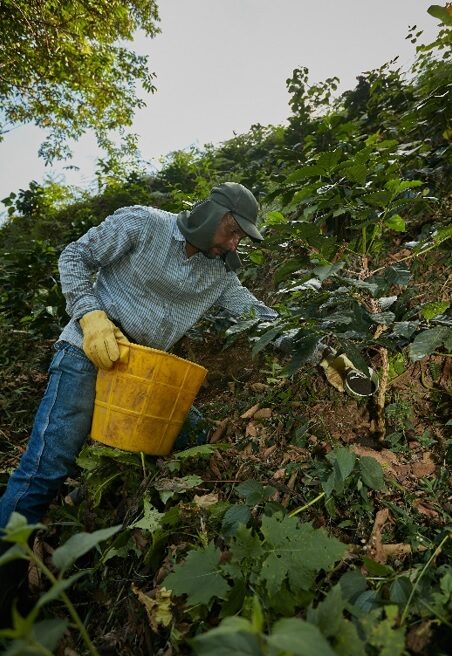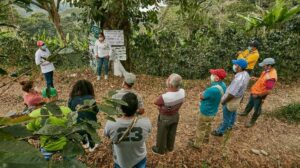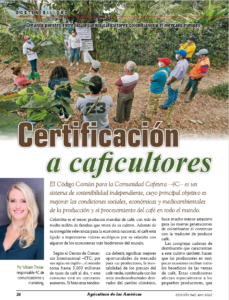Building bridges between Colombia’s smallholder coffee farmers and the European market

Colombia is the third-largest coffee producer in the world with more than half a million families living from its cultivation. In addition to its undeniable relevance for the national economy, coffee is cultivated in some of the most biodiverse ecosystems, linking it to important ecological values. According to the ITC (International Trade Center), the world drinks up to three billion cups of coffee a day, and this consumption is constantly increasing. While this trend should lead to improved market opportunities for its producers, the instability of green coffee prices combined with the environmental challenges derived from climate change, make it much less attractive for younger generations of Colombians to continue producing coffee. The highly complex distribution chains also mean that producers rarely receive the full benefits from the coffee sales. These conditions particularly affect small producers, who constitute more than 95% of coffee farmers in Colombia. In this context, sustainability certification addresses negative impacts of coffee cultivation on the natural environment and maximizes economic benefits for coffee growing communities by improving the competitiveness of coffee products and facilitating access to international markets.
4C (Common Code for the Coffee Community) is an independent sustainability system, whose main objective is to improve the social, economic, and environmental conditions of coffee production and processing throughout the world. The 4C certification includes independent third-party audits that verify compliance with comprehensive sustainability criteria. The creation of the 4C Code of Conduct was achieved through a participatory, transparent, and balanced consultation process involving various coffee industry stakeholders. At the end of 2021, already more than 300,000 coffee producers around the world have obtained 4C certification.

Giovanny Puerta Becerra: beneficiary coffee grower of the 4C project
Recognizing the challenges faced by coffee producers in Colombia, 4C and Melitta Europe GmbH & Co. KG – Coffee Division – initiated the joint project “Improving the working and living conditions of small coffee farmers in Colombia” in mid-2020. It is co-financed by DEG – Deutsche Investitions- und Entwicklungsgesellschaft mbH with funds from the develoPPP program of the German Federal Ministry for Economic Cooperation and Development (BMZ).
Improving sustainable agricultural management
Since the start of the project a combination of group, individual, online, and in-person trainings have been conducted by 4C and its implementing partner the National Federation of Coffee Growers (FNC). Until mid of March 2022, 386 coffee growers have received technical assistance on applying best management practices during individual farm trainings. In addition, online and in-person group trainings have been conducted to support coffee growers in improving agricultural practices and techniques for processing coffee. Among others, the group trainings covered topics like dry and wet processing, marketing strategies, coffee farms renovation, soil management, and occupational health and safety. Moreover, in preparation for the 4C audit, trainings on how to fulfill the requirements of the 4C Code of Conduct were held at the farms and during online workshops.

Kenny Gutierrez y Kelly Olaya, project field officers conducting a group training in Vista de Nieve, Santa Marta district
In 2022 the support for coffee growers in the Magdalena region will continue while the aim is also to spread the learnings to further beneficiaries and enable them to gradually improve their management practices and maintain the 4C certification. This will be done through additional visits to farms and group trainings. The group trainings will be conducted by farmer leaders, who are themselves beneficiaries of the project and will share their knowledge to fellow farmers. These farmer leaders were selected based on their commitment to the project and promoting sustainability within the community. Furthermore, the project beneficiaries will also be supported financially to make necessary investments to implement the learnings from the trainings.
4C certification and improved access to European markets
The 4C audit took place between the 2nd and 6th of November 2021 and 437 coffee growers representing 455 small scale farms successfully passed the audit and received the 4C certification. This key result promotes sustainable coffee production in the region, while also raising awareness for the conservation of primary forests and protected areas. It also strengthens the protection of human and labor rights, while fostering more efficient and profitable coffee production. After implementing the improvements to achieve 4C certification, the project beneficiaries were satisfied with the changes they observed on their farms. Walter Guevara, a coffee farmer from Cienaga municipality emphasized: “4C motivates us to conserve the environment and be more organized, which is perhaps something that we have not been doing very much, and above all, it motivates the young people to adopt these practices that are fundamental to conserve nature and to develop ourselves.”
At the beginning of this year, Melitta acquired a first shipment of traceable 4C certified coffee from the beneficiaries of this project at a premium price. Another purchase is expected during the next harvest period lasting from October 2022 to January 2023. The level of premiums that these sales offer to local coffee growers provides a higher profitability, allowing them to cover their operational costs and generate an attractive income. This also enables them to maintain a high level of environmental protection that secures the future for coffee production in the region. The response of the project beneficiaries following the sale of coffee to Melitta was very positive. Alvaro Serrano, a coffee farmer from Cienaga Municipality, noted that “the price premium that the 4C proposal represents here is not offered by anyone else.”
Increasing the attractiveness of the sector for young adults
An additional focus of the project in 2022 is to improve opportunities in the coffee sector for young people in the community. From the end of March 2022, around 100 young adults will participate in an extensive course on promoting ecotourism activities in coffee plantations. The course is jointly organized with FNC and with the participation of ProColombia – a government agency in charge of promoting Colombian international tourism. It will run for around two months and consists of a series of in-person and online training sessions. Participants will be guided by experts from the tourism industry to acquire the necessary knowledge to develop, adapt and strengthen their own tourism business proposal to attract the interest of international markets. Among others, some topics to be covered are strategic business planning, storytelling, marketing, and costing.
Other activities for young adults are planned for this year and include trainings on barista skills, coffee tasting, and entrepreneurship. Young adults will also be supported financially to enable them to implement the learnings from the trainings. “I really like that 4C is motivating our rural youth who were discouraged from continuing with coffee growing and showing them that coffee can indeed be a profitable alternative, and that we ourselves can find a good price for it with the help of 4C certification,” said Diego Hernandez a coffee farmer from Santa Marta Municipality, located in the project region Magdalena.

Descargue la versión en español de este artículo:
Creando puentes entre los pequeños caficultores colombianos y el mercado europeo